Photo: Krystyna Felder
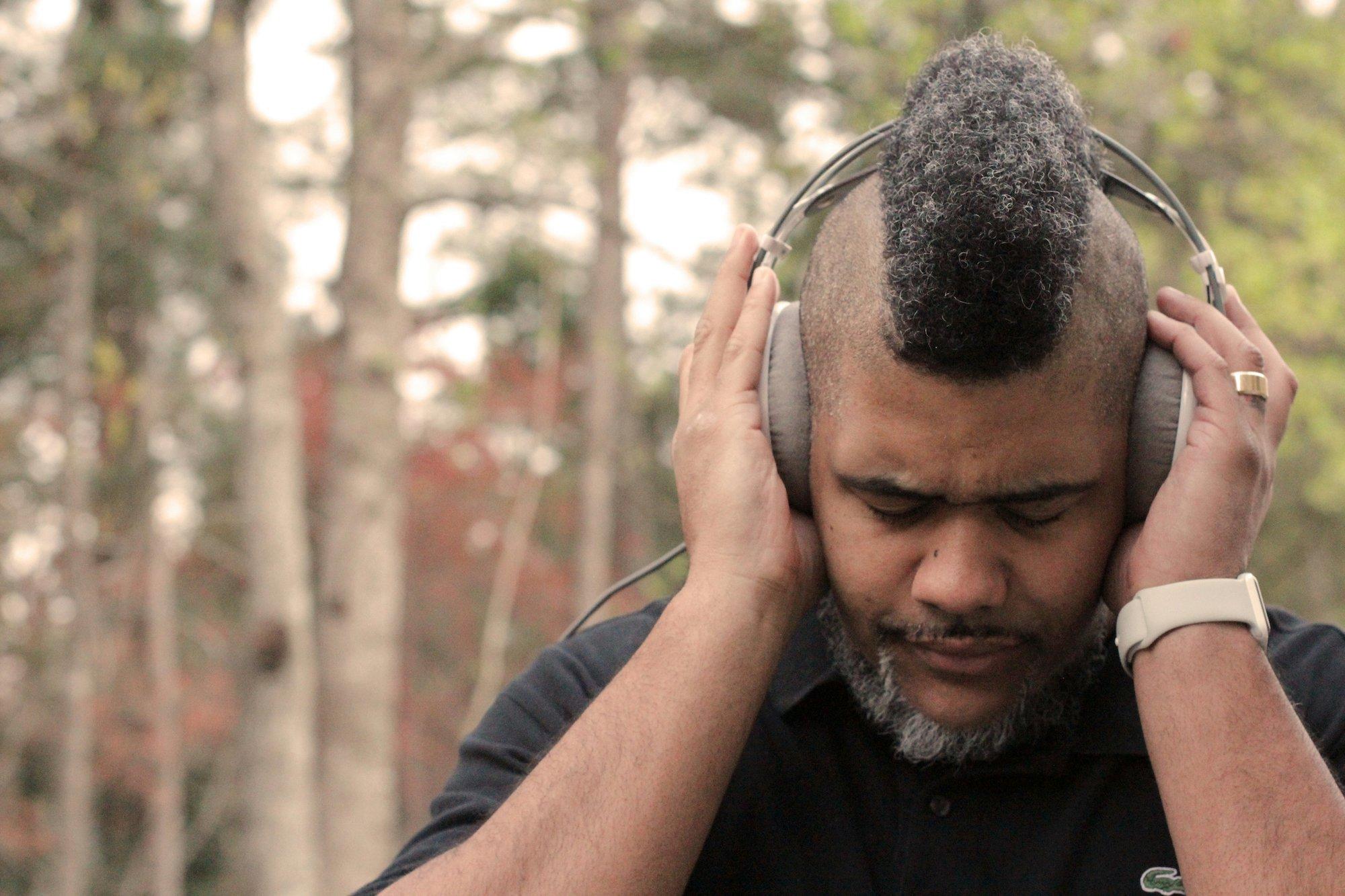
Oak Felder
news
Producer/Songwriter Oak Felder Wants The Music Industry To Support Creativity, Not Just Hits
"The model needs to change to reflect that writers get paid for records that, even if they aren't big smashes, [earn them income] at a level that they will be allowed to live," the producer/songwriter recently told the Recording Academy.
GRAMMY-nominated producer/songwriter Warren "Oak" Felder knows how to craft Top 10 hits—including Alessia Cara's "Here" and "Scars To Your Beautiful" and Demi Lovato's "Sorry Not Sorry," to name just a few. Though he has the skills and experience to craft top-charting songs, he passionately believes that the music industry should foster an environment that ensures all creatives get paid—not just the ones dominating the airwaves.
"I think it's important for creators of music to be able to create music and make a living off of it. Because right now, the only way that you are going to be able to do your job and make money to live off of is if you're getting hits," Felder recently told the Recording Academy. "How many records do you have in your life that you listened to that weren't singles, but are just as meaningful to you?"
The Los Angeles-based, Istanbul-born alt-rock lover is also dedicated to the art of mentorship and paving the way for younger creatives. Last month, he led one of the GRAMMY Museum's Summer Sessions, speaking to a theater full of high school students hopeful to pursue songwriting careers. We sat down with Felder to find out what he learned from the students, why he believes in music education and his biggest piece of advice for aspiring musicians and songwriters/producers.
You just wrapped up the GRAMMY Summer Session program. How'd it go?
Fantastic. I was sort of awed by just the concept of it. Those kids are awesome. And the program is fantastic.
<blockquote class="twitter-tweet" data-lang="en"><p lang="en" dir="ltr">Had a blast <a href="https://twitter.com/GRAMMYMuseum?ref_src=twsrc%5Etfw">@GRAMMYMuseum</a> for <a href="https://twitter.com/hashtag/summersession?src=hash&ref_src=twsrc%5Etfw">#summersession</a> <a href="https://twitter.com/hashtag/grammymuseum?src=hash&ref_src=twsrc%5Etfw">#grammymuseum</a> <a href="https://twitter.com/hashtag/DTLA?src=hash&ref_src=twsrc%5Etfw">#DTLA</a> met so many talented songwriters and musicians <a href="https://t.co/WPbSAtZVas">pic.twitter.com/WPbSAtZVas</a></p>— Ava August (@avaaugustmusic) <a href="https://twitter.com/avaaugustmusic/status/1145430336081281024?ref_src=twsrc%5Etfw">June 30, 2019</a></blockquote><script async src="https://platform.twitter.com/widgets.js" charset="utf-8"></script>
Were there any good questions from the kids, or something else that stood out to you from it?
Yeah. So one of the questions really focused on working in the studio with an artist, on bringing an artist story to the forefront and how to do that.
I feel like people forget that production and music is so psychological and they say, "Oh, well you just go in the studio, you make a beat, you write a song and you record." People forget there's a psychology to it. So that awareness surprised me. I don't think I was aware of that until I was older and much less dumb than I was when I was a kid.
Music education is SO important, but often ignored or defunded in public schools. Why do you think music education is important?
I think the kids that learn how to play the piano and play some sort of instrument when they're younger develop and demonstrate better cognitive abilities as an adult. And I think it's something that serves you, even if you're not a musician afterwards. If you've learned how to play the piano and you forgot, you still created the pathways in your brain that allow you to solve different problems, probably more efficiently than other people would.
Creativity is very important for coping with life in general. If you have an early relationship with music, it makes music as a coping mechanism a little better for you. So, education and music would apply to society as a whole. Being born and raised in another country where music is a focus educationally, I definitely see a difference between a place that doesn't focus on it as much from an educational standpoint, and a place that does.
How do you integrate teaching and mentorship into your work in the music industry?
I consider myself a natural teacher because I like to talk a lot. You kind of have to show people the ropes. I have a guy assigned to me that I consider it my responsibility to teach him. Even beyond that, after I'm done with production, I think I would continue to teach it afterwards. I definitely have the gray hairs to match with professorship, so I'm definitely going to try for that. I think teaching is important, otherwise, we'd all be sort of aimlessly walking around figuring things out by trial and error.
Did you have any mentors when you were first starting out in the industry?
The first one that comes to mind is my oldest brother Dennis. He's an amazing musician and a great guy. He definitely was an inspiration to me. I feel like I've been following him my whole life, trying to be as good as he is. I'm still not, but I'm getting there.
Another early mentor for me was an R&B producer, guy named Teddy Bishop. He gave me my initial view of what being a record producer is like, the template for what it's supposed to look like. I've been applying that to what I've been doing since.
<iframe width="620" height="349" src="https://www.youtube.com/embed/RD1tIcDlunE" frameborder="0" allow="accelerometer; autoplay; encrypted-media; gyroscope; picture-in-picture" allowfullscreen></iframe>
How do you think people within the music industry can foster a more collaborative, inclusive environment?
I think there is still the perception of corruption in the music industry. I think that the day that I am not surprised when a woman walks up to me and says, "I am a producer." That shouldn't be a surprise. The moment we can get ourselves to that point as creatives, we will diversify and mutate the state of music to a point of amazingness. Because for every idea that comes from a stereotypical producer, there's an idea that wasn't heard from someone who's not a typical producer. That's going to add to the culture when we finally get to that point. I think that should be everybody's focus.
Do you have a vision to help ensure more diverse groups are working in the studio?
Absolutely. I needed somebody for my team who did pop music very well as a producer. So I asked a friend of mine if he knew anybody and he pointed me to this producer named Zaire [Koalo] Simmons from South L.A. You wouldn't typically associate a young black producer as being somebody who is immediately capable of doing pop music at a high level. You do have black producers who are capable of doing pop music. This kid floored me. And then I was like, "Well, do you do urban tracks?" And he blew me away again.
So the rule is, give everyone a shot. Because the real thing is talent, it doesn't really matter who it comes from. It's almost like a cheat because you get to look in places that other people might not be looking. And you'll find gems that exist there.
L-R: Zaire, Oak & Nelly | Photo: Courtesy of artist
So, being conscious about when you're opening the door and that you're not just looking to the usual suspects.
Yeah. That's really important. Plus, it's our responsibility to mutate the culture. And the only way to do it is if people who typically don't have a voice are given one. That's our responsibility. I take that seriously.
You've worked with a pretty major, diverse group of artists. What's the biggest thing you've learned so far in your time collaborating as a songwriter/producer?
What I've learned is that the lack of an ego is a superpower. I'm a believer that anybody at any moment could have a better idea than you will ever have.
So I think humility is what gives you the ears to hear that idea. There have been times where I had a clear concept, direction and vision for what I want it to be. And I walked in the room and somebody says, "We should do this." My immediate reaction is no, that's not what I wanted.
[But you have to] put down your ego. That's the biggest thing that I've learned. Your ego has no space in a room of collaborators. You leave that mother***er at the door.
<iframe width="620" height="349" src="https://www.youtube.com/embed/UKp2CrfmVfw" frameborder="0" allow="accelerometer; autoplay; encrypted-media; gyroscope; picture-in-picture" allowfullscreen></iframe>
So, if you have 10 people in a room, and everyone has an idea, how do you foster an environment where everybody is listening, is collaborating, and isn't getting upset when their idea moves to the side?
First of all, if there's 10 people in the room, some of them are going to leave. It's easier to manage smaller groups of people. And then splits end up a little bit better if there's less people in the room. But yeah, if somebody has an idea, it gets out there.
You know what's funny, everybody has developed the concept of, "let me throw an idea out and if the room responds, then it sticks. If the room doesn't respond, no one says anything." You're in the room and people are writing songs and somebody goes, "Wearing leather pants." And it's silence, that idea was not a good idea.
So a room full of people who've figured that out, have learned how to regulate themselves, as a collective, works. That's what music is, a collective of creation. We're learning how to function as one unit, especially people you have good chemistry with.
What's your favorite part then about the collaborative process?
Self-discovery. And allowing the music that you make to do the same thing for yourself that it does for other people, through realizing other people's perspectives.
The story behind that is, I was in Jamaica working with Alicia Keys, she had invited a lot of us to come out and work for her project. I'm in a room with one of my producers and Miguel, who was there as a songwriter. He and I hadn't worked together up until that point. We're at this beautiful location, sitting at a table, just me, Miguel, Alicia and a couple other people. We're having a conversation about our biggest fears, going around the table.
Death is one of my biggest fears, beyond a person's rational fear of death. It gives me anxiety to even think about. I had no way of controlling that anxiety until I said "I'm scared of death." And Miguel goes, "You're scared of death? So you would want to live forever?" And I say, "Of course I would."
He was like, "Why? Where's the rush to do anything meaningful if you lived forever? If you were going to live forever, you'd probably have the most boring, unfulfilled existence."
He adds, "There's no fun in forever." And Alicia said, "That's a song." We ended up doing a song called "Where's the Fun in Forever" [by Miguel featuring Keys]. To this day, there's three songs I've produced that are my favorite and that's one of them. Because after we did the record, that anxiety lessened every time I thought about or listened to that song.
I can mark that as the first time that my own music has done for me, what other people's music, or my music, has done for other people. It's the collaboration with other people and learning their perspectives that I'm so grateful for because now I have a tool that allows me to deal with a difficult thought.
<iframe width="620" height="349" src="https://www.youtube.com/embed/AexrLJIxG8Y" frameborder="0" allow="accelerometer; autoplay; encrypted-media; gyroscope; picture-in-picture" allowfullscreen></iframe>
How do you foster that kind of collaborative space where everyone feels safe to share their ideas? And to talk about the things that are raw and kind of scary but can really get those amazing songs and emotions?
I think it's about trust. When a person comes to my studio, especially if it's somebody that I've never met before, I have to expose my own vulnerabilities first. To give them the signal, look this a safe space. What that ends up doing is it gives the artist an opportunity to tell me things about their personal life they would never in a million years want anyone else to know. So that we can then take those stories and turn them into music, because that's the process.
But it starts with you being comfortable enough to expose your own vulnerabilities and hoping not to be judged for whatever they are. And like I said, having no ego is a superpower, because the ego is what gets in the way of being able to do that initially.
And then you have a session where people sit in a room and it's kind of awkward, nobody's saying anything. Where it's, "So what are you working on?" "Same sh*t you're working on." As opposed to, "I woke up this morning and I was feeling like crap because my dad called me," etc. You're having this kind of conversation with somebody that you've just met. It's a disarming thing to be that vulnerable with somebody else. And when they see that they open up as well.
That's the key, vulnerability, because it creates trust. And puts them in a position where they're able to say, "You know what, let's write a song about this thing that I experienced, that I would never in a million years tell anyone, but let's write a song with that energy in it." A lot of my biggest records are records that have been written that way.
That's really cool; leading by example and setting the tone.
Absolutely. I think the best kind of leader is the one that leads from the front.
So what's your biggest piece of advice for young, aspiring artists? What about for young songwriters and/or producers, those who are more behind the scenes?
I say this to everyone: Know your history. Current music is the tip of the iceberg, it's being supported by a large group of music that proceeded it. If you are a rapper, then you should know why Tupac is important, why disco is important, and why a break beat is important and how it contributed to the culture.
Actually, my partner (Andrew "Pop" Wansel) just produced a song for Nicki Minaj that samples a classic dancehall record (called "Filthy Riddim"). This record is historically and traditionally a song that will always get the club popping, but the newer audiences haven't been exposed to it yet.
<iframe width="620" height="349" src="https://www.youtube.com/embed/C3a1sz2Bp_E" frameborder="0" allow="accelerometer; autoplay; encrypted-media; gyroscope; picture-in-picture" allowfullscreen></iframe>
What do you want your legacy to be?
I want people to remember that he was a nice guy. And I want people who are successful in the industry to be able to turn around and say, Oak helped me do this. That's my biggest dream, wish, goal. Because I want, in 20 or 15 years, to be able to be the person who gave a shot to someone who made a difference. And in so doing that, make a difference myself.
What's your biggest hope for the trajectory of the music industry, the biggest thing that you wish to see that isn't happening yet or is just starting to happen?
I want us to get paid. I'm part of the MLC [the Music Licensing Collective], and I think it's important for creators of music to be able to create music and make a living off of it. Because right now, the only way that you are going to be able to do your job and make money to live off of is if you're getting hits. That wasn't the case in the '80s or in the '90s; you could've produced three records on an album that weren't necessarily singles. How many records do you have in your life that you listened to that weren't singles, but are just as meaningful to you?
In today's cultural climate, that is starting to become a thing of the past. Because the economic structure of the music industry only rewards people who have big singles, which means the big singles are the only ones that influence culture, i.e., there's no album record that really speaks to people.
And think about this: From a creative standpoint, when I get in the studio and I know the only thing that's going to make money is a big hit smash, that's all I'm focused on making. I'm not gonna make the "Where's The Fun In Forever" record, which wasn't a single, it was an album cut on that album. But it's a record that affected me and it probably affected other people in the same way. Those don't exist with the current model anymore.
The model needs to change to reflect that writers get paid for records that, even if they aren't big smashes, we get back to getting paid at a level that they will be allowed to live. That is my single biggest wish for the music industry right now.
Meet Ericka Coulter, The Inspirational Music Exec Amplifying Rising Talent With TheBasement
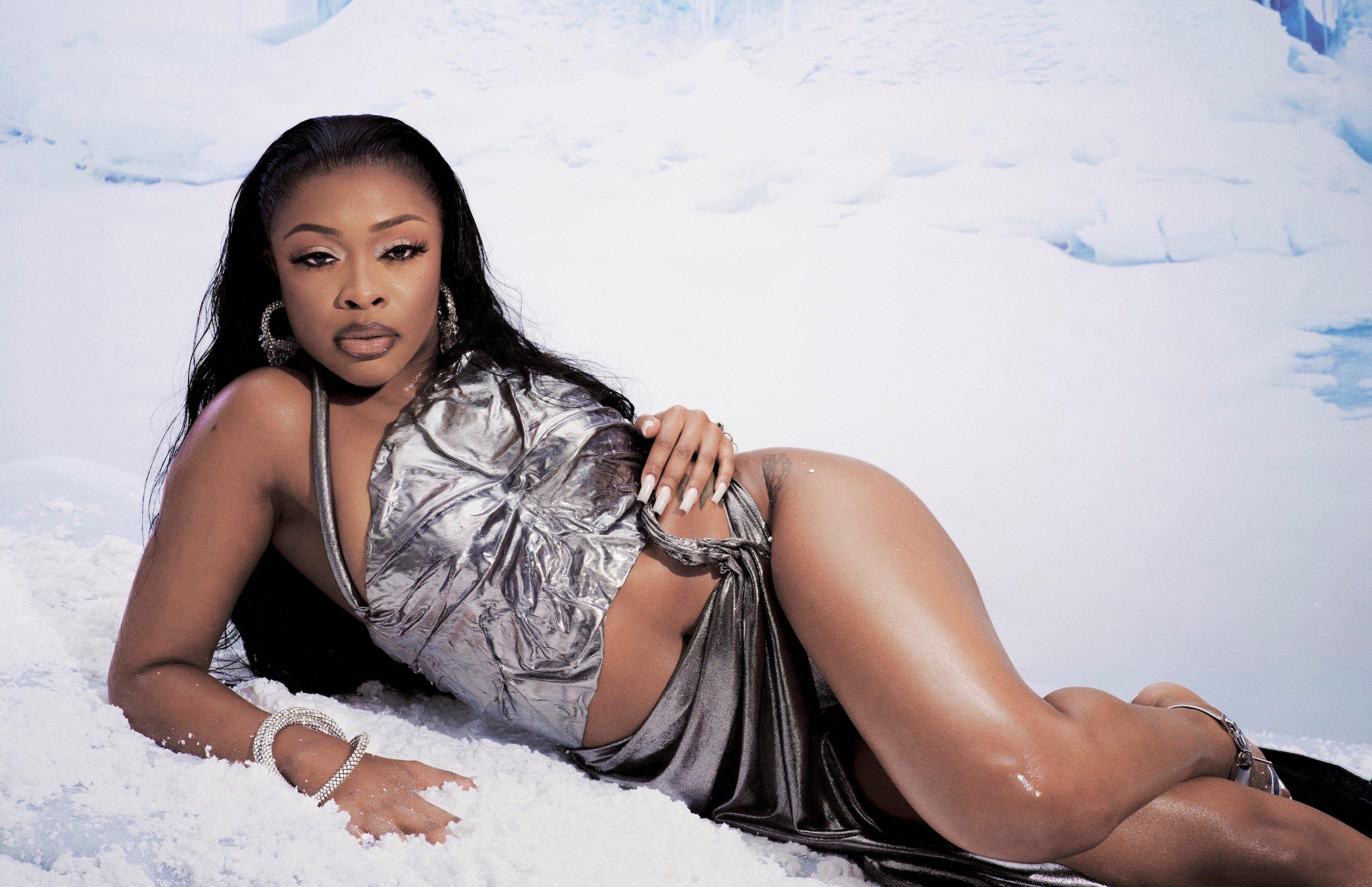
Photo: Alex Harper
feature
With Her 'Winter's Diary' Return, Tink Is Ready To Rep For "The Girls Going Through It"
On her latest album, 'Winter's Diary 5,' R&B songstress Tink perfects the soul-baring storytelling that put her on the map — and further leans into her purpose.
The first time Tink's name was on a lineup with Jhené Aiko, they were at Sacramento's R&B festival Sol Blume in 2022. Two years later, they're billed together again — this time, as tourmates.
Tink is one of four opening acts for Aiko's Magic Hour Tour, which also features Coi Leray, UMI and Kiana Ledé. As the 27-date trek begins winding down with its final stretch of shows (wrapping in Columbus, Ohio, on Aug. 22), Tink can't help but think about how "full-circle" the tour has felt.
"That was just a real manifestation," Tink tells GRAMMY.com, explaining that she's been "praying" for the opportunity since meeting Aiko at Sol Blume. "There's so many R&B girls that could have been in this position. The fact that she brought me on this tour speaks volumes."
Her slot on the sold-out tour signals Tink's growing appeal, and the all-female lineup is no coincidence for the singer. Tink's matter-of-fact storytelling and no-holds-barred approach is what made listeners gravitate toward her, especially women. Fans and critics alike praise Tink for her unwillingness to sugarcoat her emotions, particularly on her Thanks 4 Nothing album, and she continued it with her latest release, Winter's Diary 5, out now.
A long-awaited new installment of her Winter's Diary mixtape series, the project (which, this time, is a studio album) digs deep into her ongoing journey toward self-acceptance in the face of heartbreak and betrayal. From the fed-up lyrics of "Huh," to the sexually charged "Bless Me Don't Stress Me," to the deeply personal "Lows & Highs," Winter's Diary 5 sees Tink holding herself accountable for the failed relationships she sings so honestly about.
"The past few years have been a lot of isolation, and I've had days where I had to lock myself in my room and kind of recoup and get myself right," Tink says. "This album is definitely for those moments when you have nothing to do but face your own thoughts and your reality."
Tink's music has always mirrored her own life, but the Winter's Diary narratives involve more introspection, bringing another level of rawness and vulnerability — as she said in a teaser for WD5, "things only a diary knows." As a result, the Winter's Diary series has largely been the reason for Tink's cult following.
Tink was just 16 when she made her debut with 2012's Winter's Diary, releasing iterations 2, 3 and 4 in 2014, 2015 and 2016, respectively. In between, the Chicago native made a name for herself as a rapper in the drill scene with mixtapes Alter Ego, Blunts & Ballads and Boss Up in 2012 and 2013. Early singles like "Finger's Up" and "Bad Girl" showcased her grit, while her viral hit "Treat Me Like Somebody" revealed her angelic singing voice and vulnerability.
The string of acclaimed mixtapes earned a then 19-year-old Tink a deal with Timbaland's Mosley Music Group/Epic Records as well as a coveted spot in XXL's 2015 Freshman Class. That same year, her song "Million" (which samples Aaliyah's "One in a Million") whet fans' appetite for her debut album, Think Tink. The much-awaited project was slated for a July 2015 release before ultimately being shelved due to label issues.
By the end of 2017, Tink took matters into her own hands and reclaimed her narrative. She launched her own label — appropriately called Winter's Diary — in 2019 and hasn't looked back.
Working independently has brought her greater success, pointing to her resilience, work ethic and prowess as an artist who stops at nothing to get what she wants. It has also sparked quite the creative streak: in those five years, Tink has released five studio albums, one EP and a mixtape.
"I was just really trying to make up for lost time — I want to make sure that I'm keeping my name in the streets and that my fans are fed," Tink says. "As an independent artist, I don't have to adhere to anyone but myself, and that's what's making [the music] feel authentic. What I'm trusting works for me, so the songs I enjoy and feel proud of, I get to push those out. That's the difference."
Now 29, she brings a level of maturity and wisdom with Winter's Diary 5 that can only be learned through trial and error. But even after navigating toxic relationships in the Summer Walker-featuring "Songs About U" and acknowledging her battle scars on "Insane," she ends the album with "Pretty Girls," a powerful self-worth anthem that confidently reminds, "Pretty girls don't beg/ Pretty girls bounce back/ Pretty girls don't trip/ Pretty girls run game/ Pretty girls don't slip."
Whether or not she keeps adding to the Winter's Diary series, Tink is eager to continue growing her fan base and manifesting more big-name team-ups (she has her eye on Brent Faiyaz, SZA, and Drake next). Wherever her career goes from here, she'll always keep one thing on her mind: those who find the same solace in her music as she does.
"So many women and girls who listen to my music really need these lyrics… that's my reason and my purpose," Tink says. "I know my lane is for the girls going through it. I'm telling women's stories."
More Rap News

Ice Spice Is The Drill Queen On 'Y2K!': 5 Takeaways From Her Debut Album

Watch Young MC Win Best Rap Performance In 1990

On Rakim's 'G.O.D's Network (REB7RTH)' The MC Turned Producer Continues His Legacy With An All-Star Cast

5 Ways Mac Dre's Final Living Albums Shaped Bay Area Rap

Denzel Curry Returns To The Mischievous South: "I've Been Trying To Do This For The Longest"
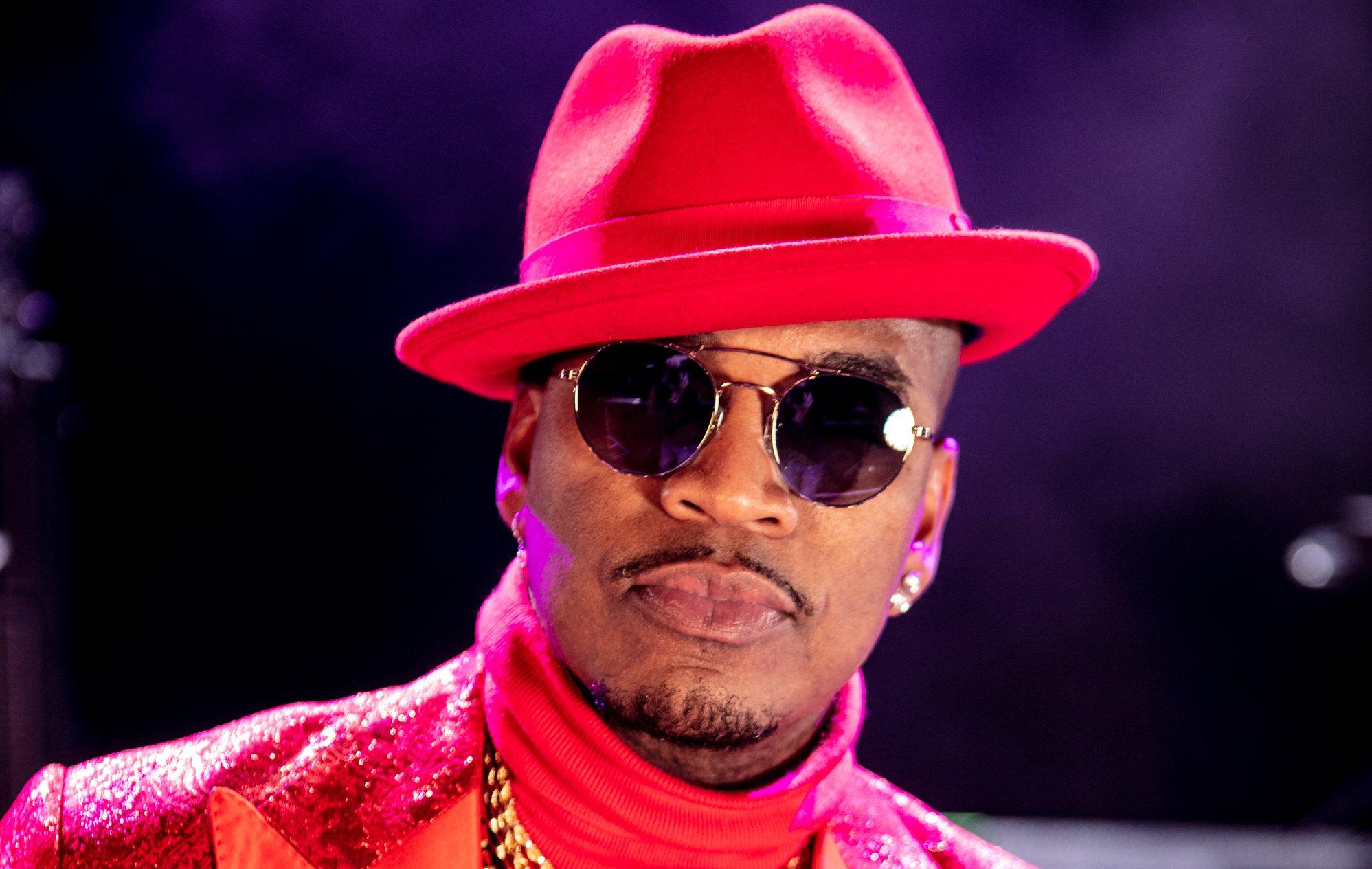
Photo: Courtesy of Vital Versatility
interview
Behind Ne-Yo's Biggest Hits: How Jay-Z, A Wardrobe Malfunction & Stargate Influenced "So Sick," "Closer" & More
As Ne-Yo takes his hit-filled catalog to the Las Vegas Strip, he shares hilarious stories about some of his most popular songs, from a three-minute writing session to a Wembley Stadium moment with Pitbull.
Aug. 7, 2024 was not just another Wednesday in Las Vegas. It was Ne-Yo Day.
No, really: Las Vegas Mayor Carolyn Goodman proclaimed that Aug. 7, 2024 was officially "Ne-Yo Day" in the city, presenting Ne-Yo with a Key to the City during his first night of his three-show Human Love Rebellion residency at the Encore Theatre at Wynn Las Vegas.
It had already been a full-circle day for the R&B hitmaker, who grew up in Sin City and got his start in the entertainment business as an understudy in the David Cassidy-starring show "EFX." As a hometown boy, Ne-Yo knew there'd be at least a few familiar faces in the crowd — and that makes his Key to the City even more special.
"I've run into a lot of girls that were not interested in me in high school and, yes, it's a totally different story now," Ne-Yo tells GRAMMY.com with a smile. "There's a part of me that wants to be petty, but I can't do that. [But] when I run into those that were mean in high school, those are always fulfilling moments."
Ne-Yo's career has been full of fulfilling moments — beginning with his 2005 chart-topping smash "So Sick," and followed by two No. 1 albums, 12 Top 10 hits on the Billboard Hot 100, and three GRAMMY Awards. He celebrates it all with his 100-minute show, which features other favorites like "Because of You" and the diamond-certified Pitbull collab "Give Me Everything."
In June, he began his journey as an independent artist after nearly 20 years with Motown and Def Jam Records, releasing the confessional single "2 Million Secrets" alongside a "CSI"-inspired video he directed himself. With a fresh start, Ne-Yo says he rarely feels like he's already two decades into his career.
"The only time it feels like it's been 20 years is right after a show where my back and my knees are bothering me," he says with a laugh. "If you don't see the age out here, I'm feeling it on the inside!"
Ahead of his Las Vegas residency, Ne-Yo sat down with GRAMMY.com to share his most memorable moments with some of his most beloved hits, from a hilarious wardrobe malfunction with "Because of You" to how Jay-Z helped save "Closer."
"So Sick," 'In My Own Words' (2006)
What instantly comes to mind with "So Sick" is my initial introduction to Stargate. I was at Sony Studios in New York City working with [another] group of producers. [I pass] Stargate's manager — his name is Tim, I met him before briefly. He said, "Hey, are you busy right now? I would love you to come in for a second and meet my producers."
So I walk with him over to the studio — mind you, he says they do R&B, they do hip-hop, they do a little bit of everything. And Tim is Black, so I'm expecting to walk in the room and see two Black guys. I walk in the room and they are absolutely not Black. They are two tall, lanky, white guys with accents. They're from Norway. And I'm like, These guys are gonna do some R&B music for me, huh?
The very first track they played was the music that we now know as "So Sick." I listened to it for like, 10 seconds, and I'm like, "Run it back." So they played it again, and by the time the song finished playing the second time, the song was written. I wrote that song in maybe 3 minutes.
It was a song that needed to be written for a long time. It just hadn't found the right backing music for it yet.
"Sexy Love," 'In My Own Words' (2006)
Here's the first time I realized that Stargate was producing around what I was writing. I wrote "Sexy Love" to the skeletal track they gave me, and then about a week later, I go to the studio and they're like, "You got to hear this." A beat comes on, and it's vaguely what I'd recalled, but completely different. They basically changed the whole beat based around [what] I wrote. So the "Sexy Love" we now know, that was not the original track.
I'm like, "I don't mind, because it sounds great, but why did y'all do that?" And they were like, "We just felt like this direction complemented the song more." They're the only producers that I've ever worked with that do that.
Nowadays, the producer is kind of a celebrity too. Everybody has a tag, and you hear the producer's name before the song starts. You'll never hear that from Stargate. They're like, "You're gonna listen to this song, and you're gonna love it so much that you're gonna ask who did it."
"Because of You," 'Because of You' (2007)
The part in the video where I don't have any shoes on — the performance piece — that was not by design. I don't remember who styled that video, but all the shoes they brought were too big. [They] were 11 1/2, I'm a size 10. But I couldn't do it barefoot, so I'm like, "Alright, let's just do it."
So I'm dancing, and then whoop! There goes one shoe. I look at the director, and he's like, "Just keep going!" So I kicked the other one off, and just continued doing what I was doing.
I've danced barefoot and in socks in the kitchen, you know, trying to moonwalk and all of that countless times as a kid. But I'd never done it as an adult. It was a bucket-list moment, scratched it off: performed with no shoes.
"Closer," 'Year of the Gentleman' (2008)
I wrote it with the intent of selling it to somebody who would make more sense with that style. We stayed overseas for damn near two years, just touring around. While I was over there, I started listening to a lot of house, techno, EDM. With a lot of those songs, there might be two words in the whole song just repeated over and over. But I'm paying more attention to what the music is doing to the people that are listening… Everybody goes nuts. These people are getting this kind of response with no words!
So I'm like, imagine if somebody took that energy and wrote a song over it that actually means something — it'd be double the effect, right?
Me and Stargate get in the studio. They start putting together the track, I write the song, it's done. We're listening back, and I'm like, "Yeah, we will be able to sell this easy." And they're like, "Sell it? No, no, this is yours." And I'm like, "Nah, I don't think my fan base is gonna understand that."
I let my management hear it, and they're like, "Yeah, this is yours." I let Jay-Z hear it, [and he's like] "Bro, this is the one!" I'm like, "What are y'all hearing? Because I don't get it."
I did not expect the song to do well. And for the first three, four months, it didn't. Here in the States, nobody was feeling it, to the point where we walked into the label one day with the total intention of telling L.A. Reid we should switch to another single. As we're walking to L.A. Reid's office, Jay-Z stops me and goes, "I know you about to tell him that you want to get off that record. Do not get off that record." And I'm like "Bro, it's been four months!"
That same year, we did the BET Awards. I performed "Closer," and the Jabbawockeez was a part of the show. After that performance, that song took off. My manager hits me with the "I told you so" every single time we think of "Closer."
"Miss Independent," 'Year of the Gentleman' (2008)
"Miss Independent" was the first time I ever won a GRAMMY. I learned through winning a GRAMMY for that song that there are GRAMMY wins that are not televised.
I'm walking the red carpet, just soaking it all in, taking pictures, doing interviews, and as I'm talking to some interviewer, this girl blows by me and goes, "Congratulations, you just want a GRAMMY," and keeps walking.
So I go to my manager, I'm like, "Yo, um, did we win?" And he's like, "F—, who told you?" And I'm like, "I don't got my speech!" He's like, "You don't need a speech. You won for a category that's not televised, so you're not gonna get on stage."
It was kind of bittersweet, because I've been dreaming of a GRAMMY since childhood. I have my acceptance speech written already. I was gonna get up on stage and thank my mom, and do the whole thing, like, "Oh wow, this thing's heavy!"
I've won three GRAMMYs, and I've yet to walk across the GRAMMY stage and thank my mom. I might just do a Kanye. I might just walk up on stage when somebody else is accepting their GRAMMY and go, "Hey, congratulations, but while I'm here — um, yeah, never got to do this before, so" and just have somebody bring mine out and do it right then. I think that'd be a moment! And then I'd instantly get arrested and kicked out of the GRAMMYs and banned forever. [Laughs.]
"Give Me Everything," Pitbull's 'Planet Pit' (2011)
We were in the U.K., Wembley Stadium, 80,000 people, me and Pitbull [for Capital FM's Summertime Ball in 2015]. Right at the part where it says, [sings] "Grab somebody sexy tell 'em hey," 80,000 people [are] jumping up and down at the same time. The whole place was shaking. It felt like electricity shooting through you, there was just so much energy coming at the stage. I literally felt sparks.
Pitbull felt it too. After the show, he was like, "Yo, right at the part where we went—" and I was like, "YO I know right! You felt it too?"
Me and Pitbull are actually really good friends. I met him before he became Mr. Worldwide and started wearing the suits and the whole nine. We've actually done a bunch of music together that the world has never heard.
Pitbull is not your typical celebrity. From a guy who's having the success that he's having, you would expect an ego, a big, huge entourage, and a whole bunch of commotion around him. He doesn't club. He does the most amazing party music ever, and he doesn't go to regular clubs. Pitbull's definition of a club? He has his own island, and he'll just invite you to the island.
"2 Million Secrets" (2024)
The song is about owning your s—. No one is perfect, no one is above making a mistake. But no one is beneath redemption, either. I absolutely made some mistakes in my previous marriage. And, you know, one thing that music has always been for me is therapy. If I have things that I couldn't say out of my mouth, I could write it in a song.
It took a little bit of growing up, maturing, for me to even write that song. For whatever reason, when you do something wrong and you know that you're wrong, my first instance was to place blame on anybody but myself. I quickly realized that that's not the way to heal, that's not the way to move on, that's not the way to receive redemption for what you have done. You have to own your mistakes… and then pray for redemption and acceptance of your apology from the people that you've wronged.
Writing the song was very much therapeutic for me. I don't even call it a song. It's more of a confessional — it's me confessing to the wrongs that I did, and realizing that the best way to go about it is to get it out and then figure out how to move on. And that's exactly what me and my ex-wife have done. We moved on. We're in a great place now.
More R&B News
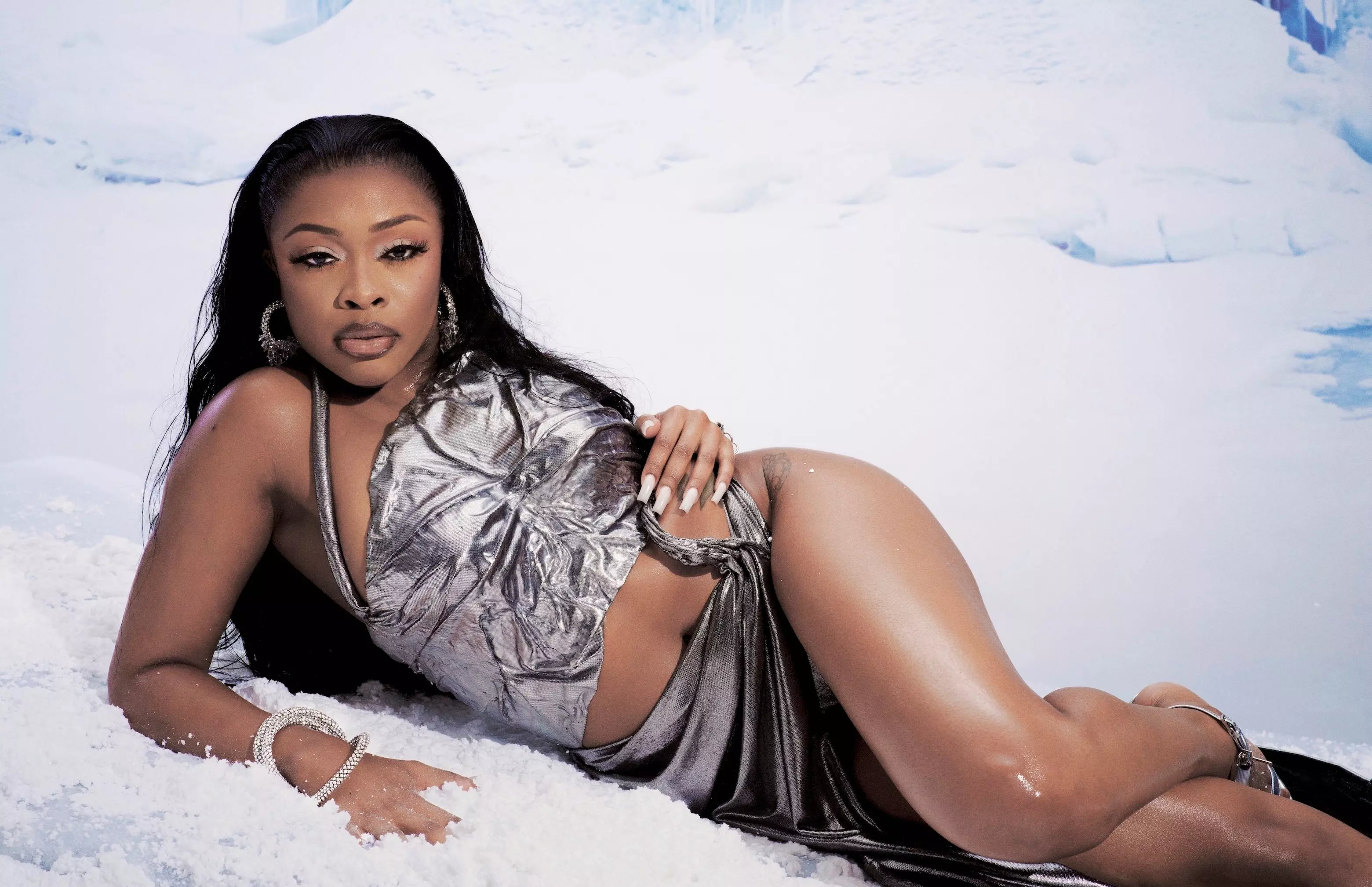
With Her 'Winter's Diary' Return, Tink Is Ready To Rep For "The Girls Going Through It"
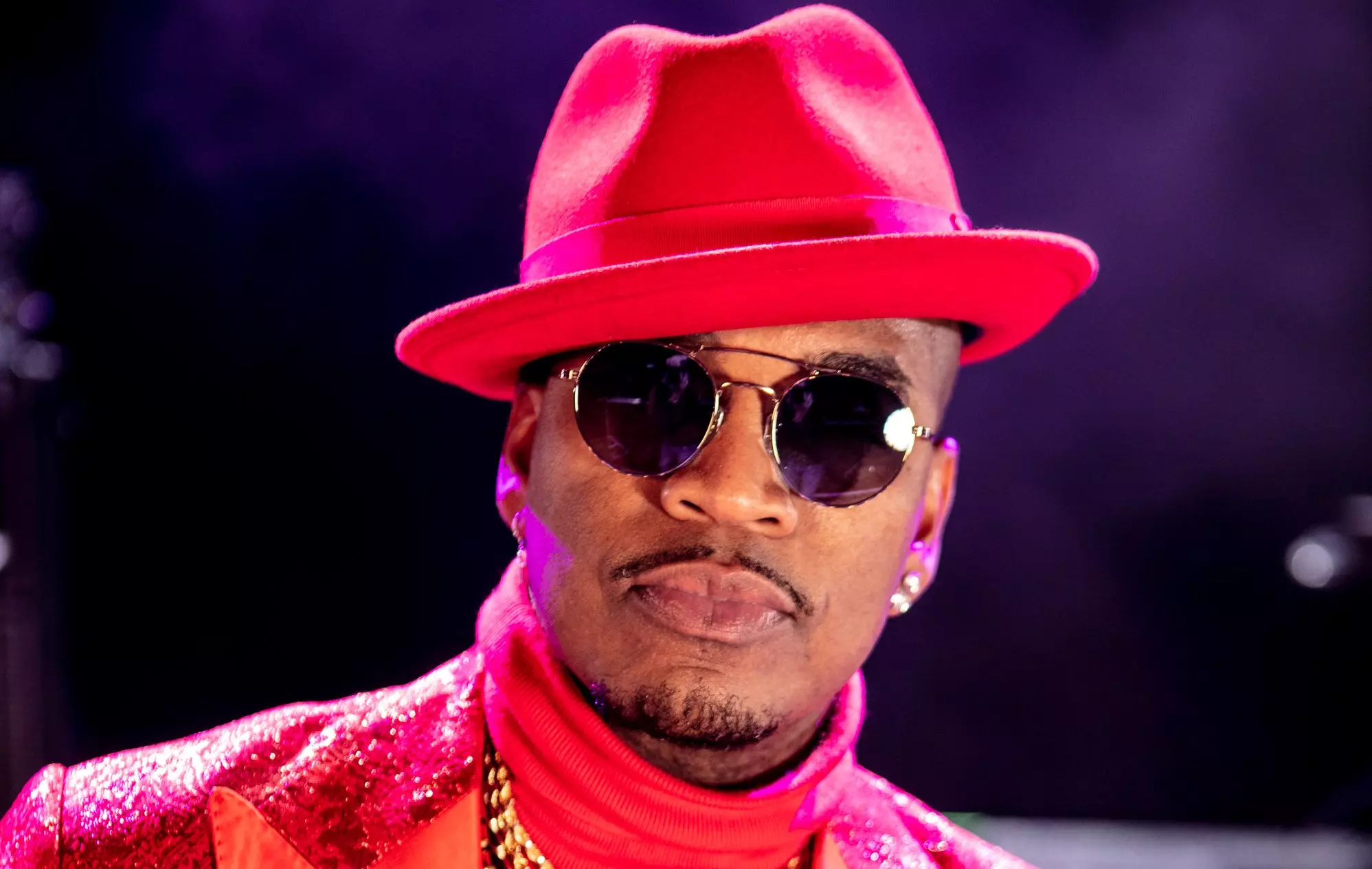
Behind Ne-Yo's Biggest Hits: How Jay-Z, A Wardrobe Malfunction & Stargate Influenced "So Sick," "Closer" & More
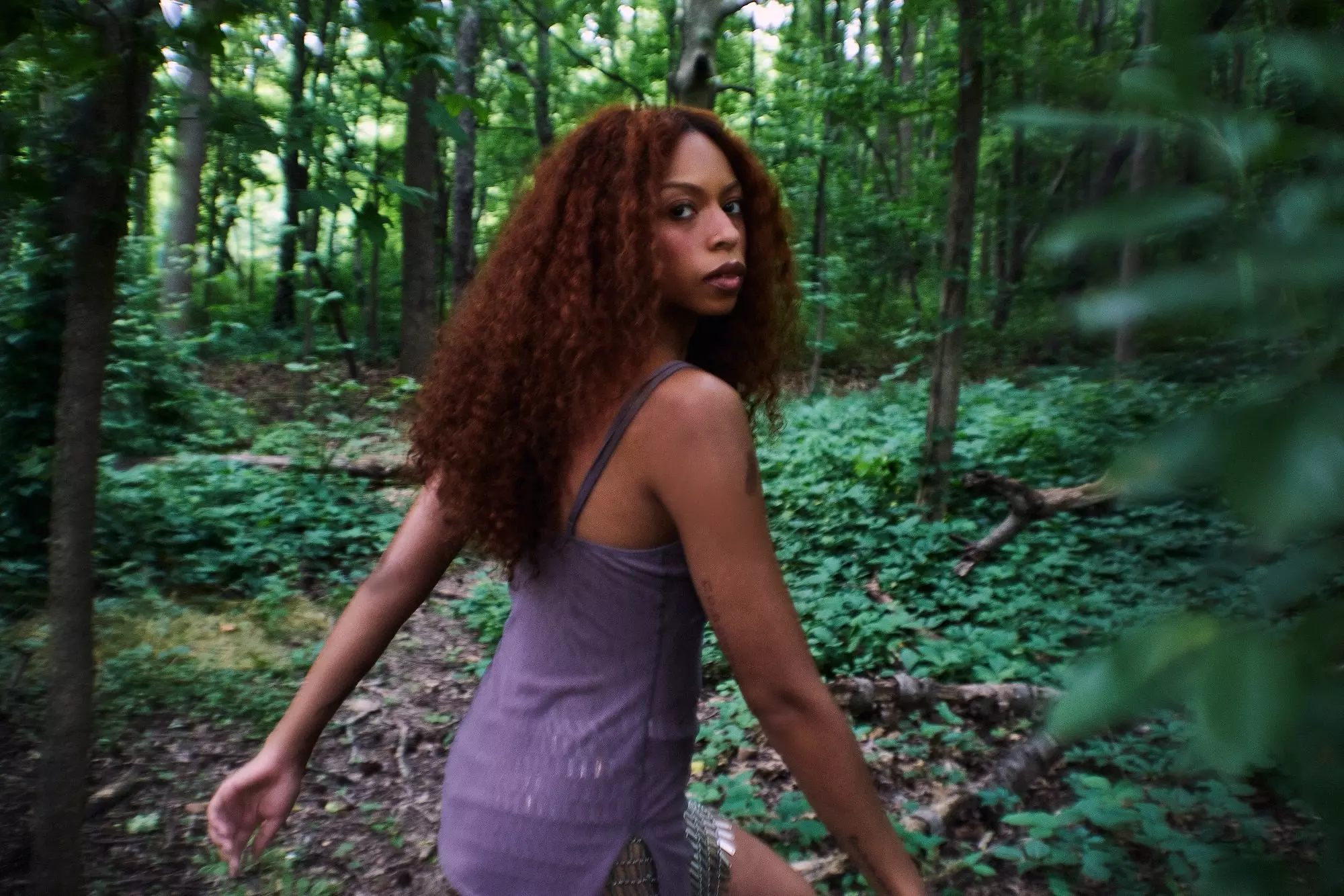
How Ravyn Lenae Found Comfort In Changing Perspective

Ayoni Performs "Bitter In Love"

Watch Stevie Wonder Win Album Of The Year
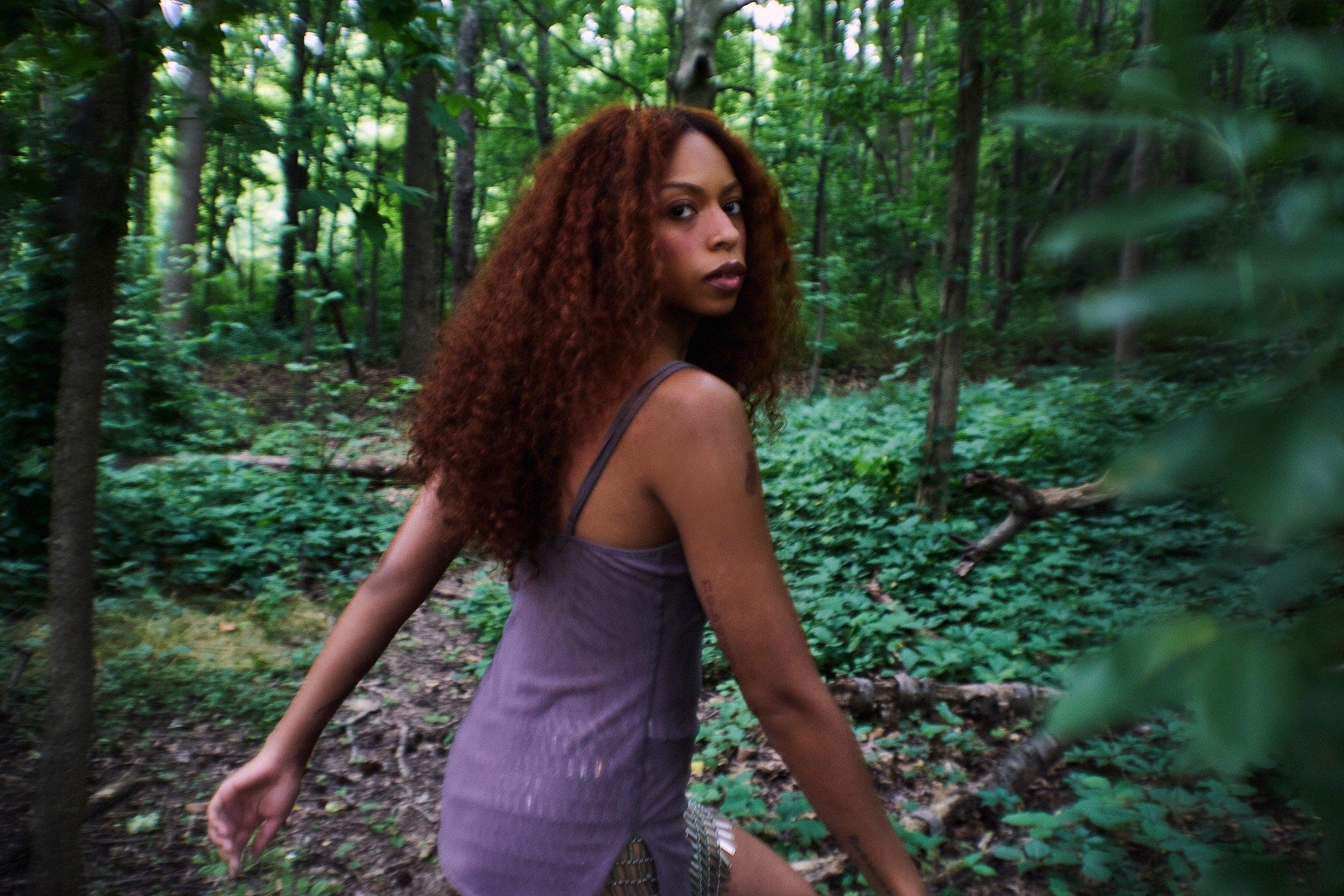
Photo: Xavier Scott Marshall
interview
How Ravyn Lenae Found Comfort In Changing Perspective
"I really wanted to give people a glimpse into my life," Lenae says of her new album, 'Bird’s Eye.' The singer/songwriter discusses taking the right risks, and the song that helped repair her relationship with her father.
With massive crowds and countless critics raving about her debut album, Ravyn Lenae knew what she had to do: completely ignore all of the expectations that led to it.
"I knew in order for me to keep evolving as an artist and a person, there was no choice but to let those boundaries go,"she says from her home in Los Angeles.
After building up a growing following in Chicago alongside other members of the Zero Fatigue Collective (which includes producer Monte Booker and rapper Smino), Lenae relocated to the West Coast. She made a massive mark on 2022’s Hypnos, which featured a beguiling mix of alt R&B, house and soul alongside Renae’s magnetic vocal presence.
And rather than coast, Lenae dug deeper for the followup, Bird’s Eye (due Aug. 9). Working with frequent Kendrick Lamar collaborator and in-demand producer DJ Dahi, Bird’s Eye flutters across genres and influences — pulling from Fleetwood Mac on one track, drawing in Childish Gambino on another, and adding Jimmy Jam’s bass elsewhere. Indicative of these multifarious influences are two pre-release singles: the retro pop-leaning "Love Me Not" and the soulfully skipping "Love Is Blind."
Lenae uses that shapeshifting methodology as a way to interrogate the concepts of love and relationships — never content to rest on her laurels, learning how best to grow and adapt. "Making the songs and getting to the bottom of what they meant for me was me kind of retracing my steps a little bit and really acknowledging all these moments in my life, in my childhood, that were pivotal for me and my identity," she says.
Nearing the release of Bird’s Eye, Lenae spoke with GRAMMY.com about directing the video for "Love Me Not" in Chicago, blending Brazilian music with Prince inflections, and how the album helped her reconnect with her father.
A lot seems to have happened in the two years since 'Hypnos.' On a month-to-month, day-to-day basis, how much do you shift creatively?
It feels like night and day to me, even though it's been a really short amount of time. During this time between Hypnos and this album — the recording and creating process — a lot unlocked with me. [There was] a lot of personal growth that happened that allows me to approach music in a much freer and kind of impulsive way.
With the last album and that process, I think I did place a lot of parameters around what I had to be, what I had to sound like, what it had to feel like, who I had to connect with. And I kind of just released all of those expectations with this and made music that I wanted to hear.
How easy was it to actually release those boundaries and work more more in the moment?
I knew in order for me to keep evolving as an artist and a person, there was no choice but to let those boundaries go, if I wanted to keep pursuing music in a way that felt honest. And then being able to collaborate with people such as Dahi, who has kind of mastered that in a lot of ways, and learning from him and seeing his process, seeing how easy and natural it is to just fall into what feels right…
I think the longer you're in an industry or you're in something, the more rules you place on [creativity] and the more you overthink it and try to mold it in a way that doesn't feel impactful. As an artist, being around him and him encouraging that type of process, I think that was a lot of it, too.
Dahi's worked with some incredible artists, and clearly in a way that accentuates that artist rather than making it about DJ Dahi. That must have been so perfectly aligned with your openness, to go in and let yourself learn what you wanted to do. They always say if you know too much and plan everything out, you’ll end up stifled creatively.
It's so true. And that's why I describe it as me kind of returning back to that 12-year-old me, that 13-year-old me, before I cared about opinions, what people thought about me and what I was doing, what I was wearing. I think we start off that way, and then the older we get, the more we get so self-conscious and we judge ourselves more harshly than everyone else.
Why do we do that?!
[Laughs.] I think it's just human nature. And then we try to unlearn all of it.
Even just in daily life, it's so hard to not think about what I could have done at any given moment. And when you’re creating music, there are 5 million ways you can create the same idea and you have to just land on that one.
A hundred percent. During this process, we would have a song idea and then three different versions of that song that hit completely different feelings — maybe a more soft rock version of it, maybe a more indie version of it, maybe a more soulful version. Then it was about having to settle into what is "the one" and what feels the best, versus like what's going to chart or what's going to get in the club. Having to release all of that and just really lean into what feels good is what works every time.
That relates even to how the album was announced, with two tracks that almost speak in conversation with one another. Those songs balance such clever hooks with more nuanced conversation about how conflicted and complex love and relationships can be. How did you find that balance between emotional realism and such immediate music?
It was just really feeling empowered and confident in my decision making. And that's something that's developed over time, too. Really listening to my voice and what I want out of music in my career and my rollout, you know?
Listening to that, obviously having people around me who are like-minded in that way like my management and my team. We all kind of empowered each other to lean into those feelings. At no point in this process did anything feel forced or like I was reaching for something.
That’s so interesting. You want your team to feel supportive but you also want to feel empowered to take risks away from that support. And that reminds me of “Love Me Not,” which has some really smart risks. It's that vintage pop feeling, right down to the clap-along beats, and the vocals feel right in your ear. So when you started working on that track, for example, did you always imagine it being that nostalgia, that warmth?
I thought that there was just something so cool and timeless, a classic feeling about it. And my songs are the ones where you can really pinpoint what the influences are, or when this was made, or the person behind it. Having a song like that, that really reminded me of Outkast. Like, What is this?
Even before it dropped, I remember having some anxiety around maybe my fans not liking it because it feels a little different from Hypnos. I think anytime you kind of jump outside of the bubble you've kind of created, it's scary because there are people living in that bubble with you who like the temperature in there.
It’s so important to be constantly revitalized in your work. If you’re doing the same thing, even if your fans are demanding it, you’re not going to get that. And hopefully when your fans see all that you can do, they’ll follow it.
Yeah. And there's so much left in me to explore into and put out into the world. And look at an artist's career, someone like Tyler, the Creator: Seeing where his sound started and how he's almost trained his fans’ ears to be receptive to something new every time. They've completely grown up with him in a lot of ways and expanded their palate. Kind of forcing the hand of listeners is something that's really interesting to me. [Laughs.]
I love that idea of pushing yourself and pushing your fans, but still within the realm of what's good. [Laughs] Not just experimenting for the sake of it. Speaking of growing and experimenting, I wanted to ask about the “Love Me Not” music video that you directed. It feels so well shot but still so intimate and casual.
I knew with the album and how I wanted the imagery to feel, it would be very homey. Making the songs and getting to the bottom of what they meant for me was me kind of retracing my steps a little bit and really acknowledging all these moments in my life, in my childhood, that were pivotal for me and my identity, those first moments where I felt like I was getting closer to myself in a way.
A lot of that started on the South side of Chicago, at my grandmother's house, in the basement. Even the cover of the album symbolizes that transition for me. That's where I dyed my hair red for the first time in the basement, in the sink, so coming back to the sink and dyeing my hair ginger on the cover was something that felt so powerful and defining for me. It just made perfect sense that we were going to go back to Chicago for the first video, in my grandmother's house, with all my family members involved. Those are my grandparents, my mom, my sisters, so that's why it feels so loose and candid. I really wanted to give people a glimpse into my life and what it felt like walking into my childhood home.
Getting to see a place through someone else’s eyes is so extraordinary. It really makes the little details pop. For example, the plantains cooking on the stove at the beginning.
Yeah. I associate plantains with my grandparents, my family. We’re of Panamanian West Indian descent, so those smells and those sounds, I really wanted to incorporate into the video.
That really speaks to bringing some comfort along with the risk-taking, same as having your family around. The features do a great job of bolstering you, setting up that stability, particularly Ty Dolla $ign on "Dreamgirl."
I think we just had the idea to kind of take the song into a different world in a way. When we first started the first section of the song, I just knew there was magic there. Those Prince drums and that Brazilian guitar — why do those make sense together? It shouldn't ever make sense together. But when I heard it? Oh my god, this feels like something fresh and new, but also like I've felt this feeling before.
Dahi's brain is just incredible, and then even bringing in Jimmy Jam on it to do bass was a dream come true. I knew it kind of felt like it existed in that Janet stratosphere, and I thought it would be such a cool touch for him to do that personally. Dream come true on all spectrums. I love Ty Dolla $ign, obviously grew up listening to him. He's incredible and I was so honored that he wanted to do it.
Besides Janet, were there any particular artists who were kind of central inspirations for this album specifically?
Sonically, Janet is always in the mix. With this one in particular, some Gwen Stefani, No Doubt, a little bit of Fleetwood Mac in there. I just love taking these worlds that are very different from each other and kind of mashing them and seeing what happens. It's like my favorite thing ever.
You’re trained in classical music, and it's so clear that you understand the range of emotion that you can convey. I'm just curious what happened when you went into recording — or even before that, in the writing. What was it like digging into yourself to find the narrative that matched the mashing?
Honestly, I don't think there was much premeditation with the writing and what I wanted to touch on in a way. Really leaning into those impulsive initial first feelings that a song gives me is something I really valued with this album. And moving forward, that'll be my process.
What was premeditated with the writing process with this album was, with every song, trying to really peel back those layers in my brain and those barriers lyrically. Like, What would I naturally say? Think of that and then think, Okay, how can I make this even more literal, even more personal? Even in working with my girl [songwriter] Sarah Aarons, I learned a lot from her as far as songwriting and how to really paint a picture that feels clear and concise and emotional. Not trying to find the prettiest words or the most interesting words, but really writing what feels real. And that's something that I've really, really valued and learned with this process.
Even with “One Wish” with Childish Gambino, the whole album feels like this big conversation on relationships. Being more direct feels like some advice someone would get with a relationship itself, let alone writing about it. Did that process help you actually process what was happening in your life too?
Oh man, 100 percent. And that's why music is so beautiful to me. It's really a means of opening dialogue between me and myself, and then me and the people in my life. With a song that's so important to me like “One Wish," it’s not just because it's a great song, but because this has really catapulted me into this different part of my life and repairing relationships, opening up difficult conversations — like with my father in particular. Hearing such a simple song and the response I've gotten from it has only validated me much more in the fact that these real stories, real emotions are what connects.
Have you played the album for your father?
We started repairing or rekindling our relationship maybe two years ago. The making of Bird’s Eye was at its peak and I felt like it was important for me to have a song on the album that addressed my relationship with him in order for me to release it and start to move on in a positive way.
So sharing the song with him, inviting him to be in the music video was huge for us. And then even after debriefing about maybe some feelings that came up when he heard certain lyrics or when he saw certain scenes in the video, it just opened up this really honest, candid dialogue between us and I couldn't be more grateful that I have this outlet.
More R&B News

With Her 'Winter's Diary' Return, Tink Is Ready To Rep For "The Girls Going Through It"

Behind Ne-Yo's Biggest Hits: How Jay-Z, A Wardrobe Malfunction & Stargate Influenced "So Sick," "Closer" & More

How Ravyn Lenae Found Comfort In Changing Perspective

Ayoni Performs "Bitter In Love"

Watch Stevie Wonder Win Album Of The Year
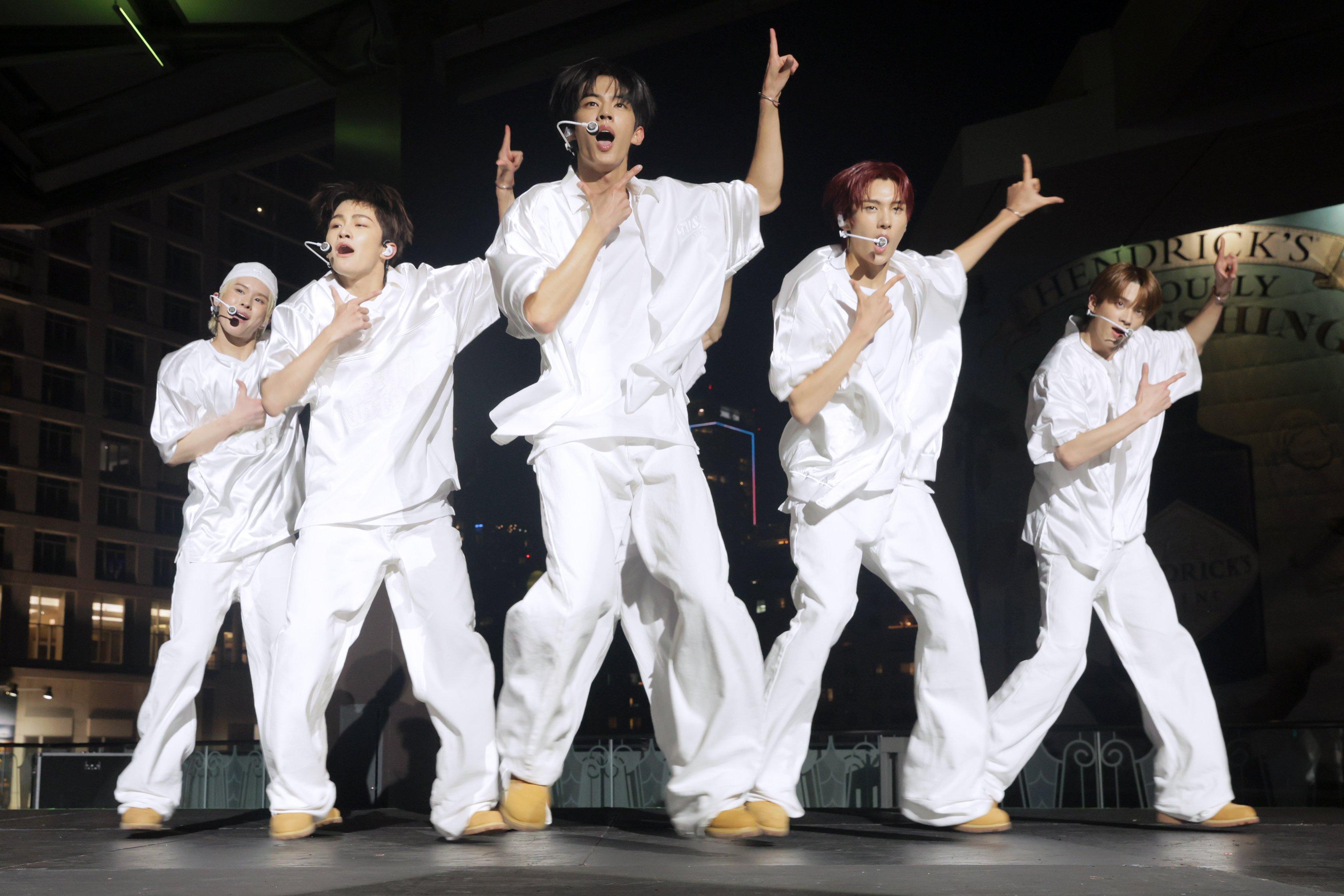
Courtesy of the Recording Academy™️/photo by Rebecca Sapp, Getty Images© 2024.
list
5 Takeaways From The GRAMMY Museum’s "HYBE: We Believe In Music" Exhibit
The first full-floor K-pop exhibit at the GRAMMY Museum runs through Sept. 15. Experience the magic of BTS, ENHYPEN, SEVENTEEN, LE SSERAFIM in an immersive exhibit of fashion, photos and more.
In 2005, South Korean producer and songwriter Bang Si-Hyuk (aka "hitman" Bang) founded Bit Hit Entertainment. Only eight years later, he finished assembling what would come to be the label’s groundbreaking boy group, BTS. The rest is history, now chronicled in "HYBE: We Believe In Music," the first full-floor K-pop exhibit at the GRAMMY Museum, which runs through Sept. 15.
Following the success of Bit Hit’s premier act, and that of other artists under acquired labels SOURCE MUSIC and PLEDIS Entertainment, the company eventually evolved to become HYBE in 2021. "I think HYBE is very special in that they have gone beyond being just a K-pop company," says Kelsey Goelz, curator of the exhibit. "They have many different sub labels. They’ve come to America and gotten involved in the music business here, and then they’re also working in AI and gaming."
But beyond its global presence, one of K-pop’s ever-captivating elements is the sheer amount of blood, sweat, and tears that goes into making it possible, even when HYBE artists like ENHYPEN, SEVENTEEN, and LE SSERAFIM make it look easy. There’s a core humanity to this work ethic and dogged tenacity — to the level of artistry in general — that speaks to K-pop fans around the world.
While HYBE’s growth shows no signs of slowing down yet, the GRAMMY Museum exhibit takes a look back on the entertainment company’s legacy thus far. Read on for the five things we learned from the "HYBE: We Believe In Music" exhibit.
All photos Courtesy of the Recording Academy™️/photo by Rebecca Sapp, Getty Images© 2024.
In A Decade, BTS Built Themselves Into A Global Phenomenon
Let’s start with a history lesson: despite being around for almost a decade, HYBE’s story begins in earnest with the formation of one of K-pop’s breakthrough acts, BTS, in 2013. (At that point, the company was still a standalone label.) Led by rapper RM, the seven boys hopped off a yellow school bus with a bratty, adolescent attitude — and that’s where the GRAMMY Museum’s exhibit picks up.
There’s a lot that happened between then and their seven Billboard No. 1s. Luckily, a wallpapered timeline breaks down all the major global highlights: the first U.S. tour, their UNICEF campaign, a landmark performance on "Saturday Night Live," and the announcement of BTS as TIME’s 2020 Entertainer of the Year, to name just a few.
Sitting in the middle of the museum floor is a glass case of polaroids — in them, Jin, Suga, j-hope, RM, Jimin, V and Jung Kook toss up peace signs while sporting novelty hats designed to look like BTS’s lightstick. Nostalgic and deeply silly, these photos date back to 2017 and 2018, serving as a reminder of the colossal strides BTS has taken in the intervening years.
Learn more: Breaking Down Every Solo Act From BTS: Singles, Debut Albums & What's Next For The Septet
It Takes A Village To Make A K-Pop Music Video
When K-pop music videos are delivered to fans, they’re already finished products. Behind the curtain, it’s hard work to make them polished and perfect. Collected ‘fits and accessories throughout the exhibit get you up close and personal with creative details; then, to showcase the costumes in action, they’re paired with screens that play the finalized MVs.
Each customized artifact is an expression of its respective group’s individuality, from ENHYPEN’s King of Pop-inspired "Sweet Venom" ensembles to BOYNEXTDOOR’s slouchy cabbie caps. Other standouts include belts and chains from &TEAM’s angsty "Samidare," fromis_9’s opera-ready "#menow" jewels, and chunky necklaces featured in ILLIT’s runaway single "Magnetic."
Everything Comes Back To The Music
HYBE’s proffered ethos is "we believe in music" — this motto gives the special exhibit its name, while also serving as a mission statement.
In a series of recorded interviews on view in the exhibit, HYBE’s idol songwriters share their process for and perspective on making music. The main takeaway: Inspiration comes in different forms. While writing, BTS’s j-hope pictures ideas as tree branches that sprout outward, while RM sees his rap verses as a realized world to live inside.
Literally, too, their lyrics mark the passage of time. If you’ve ever wondered why Suga circles back to motifs across the years, the rapper has all the answers for you here.
There’s also a conversation with WOOZI of SEVENTEEN, one of the K-pop industry’s most prolific idol composers with more than 150 credits to his name. It’s a penchant for plain language, he says, that makes the lyrics he writes really sing; the band’s beloved B-side "Hug," for example, gets its potency from everyday words and phrases. TOMORROW X TOGETHER’s Yeonjun likewise fills visitors in on the origin story behind co-written "Maze in the Mirror," a misty reflection of their tough trainee days.
This isn’t to say they haven’t had help, of course. Nearby, clips of HYBE producers Pdogg, BUMZU, and ZICO, settled in their respective studios, walk us through how the instrumentals for songs like BTS’s "ON" and SEVENTEEN’s "Lilili Yabbay" came to be. Peruse at your leisure — for those curious about the creation of K-pop’s biggest hits, this corner of the exhibit could easily take up the better part of a trip.
Fans Make K-Pop Special
To some fans, K-pop is more than just the music. As a sincere few explain in an exhibit video, K-pop is something that has profoundly touched their lives, providing the basis for genuine friendships and community. Fans get to give a little bit of this positive energy back to their idols, particularly through online platforms like HYBE’s Weverse, where users can interact directly with artists. "I don’t think there’s another genre like K-pop that allows and enables that communication," Goetz, the curator, tells GRAMMY.com.
In true form, the GRAMMY Museum offers an interactive experience. At the exhibit’s opening event, fans posed next to their idols (digitally) in a photo booth, yelled K-pop’s national anthem into prop mics, and hit the dance floor with perfect renditions of LE SSERAFIM’s "Perfect Nights" choreography.
Before heading out, visitors could leave a mark of their own on the exhibit: after writing a message to their favorite artist via pastel Post-its and baby No. 2 pencils, fans loudly and proudly displayed them on the walls.
HYBE’s Story Is Just Getting Started
According to another timeline, the story so far has three chapters. There was the era of Big Hit Entertainment, when BTS came into the picture; then, the establishment of HYBE, with its many labels. Finally, as the U.S. and Latin America enter the fold, we’re in the end game. Representing this future is L.A.-based girl group KATSEYE, a collaboration with Geffen Records and the most recent inclusion to HYBE’s roster.
But K-pop hasn’t entirely let go of its "K" just yet, if the special guests for the exhibit’s launch were any indication. As the sun set over the GRAMMY Museum’s rooftop terrace, rookie boy group TWS kicked things off; before performing high-energy five songs back to back, the six boys charmed the audience by cutely cruising through a moderated conversation in English and Korean.
As the exhibit reveals, there’s a reason HYBE — and K-pop — went global in the first place. On top of the spectacle, their success has everything to do with the work that goes into making the effort seem effortless. Audiences root for real people, and that's what makes them keep coming back.
More K-Pop News
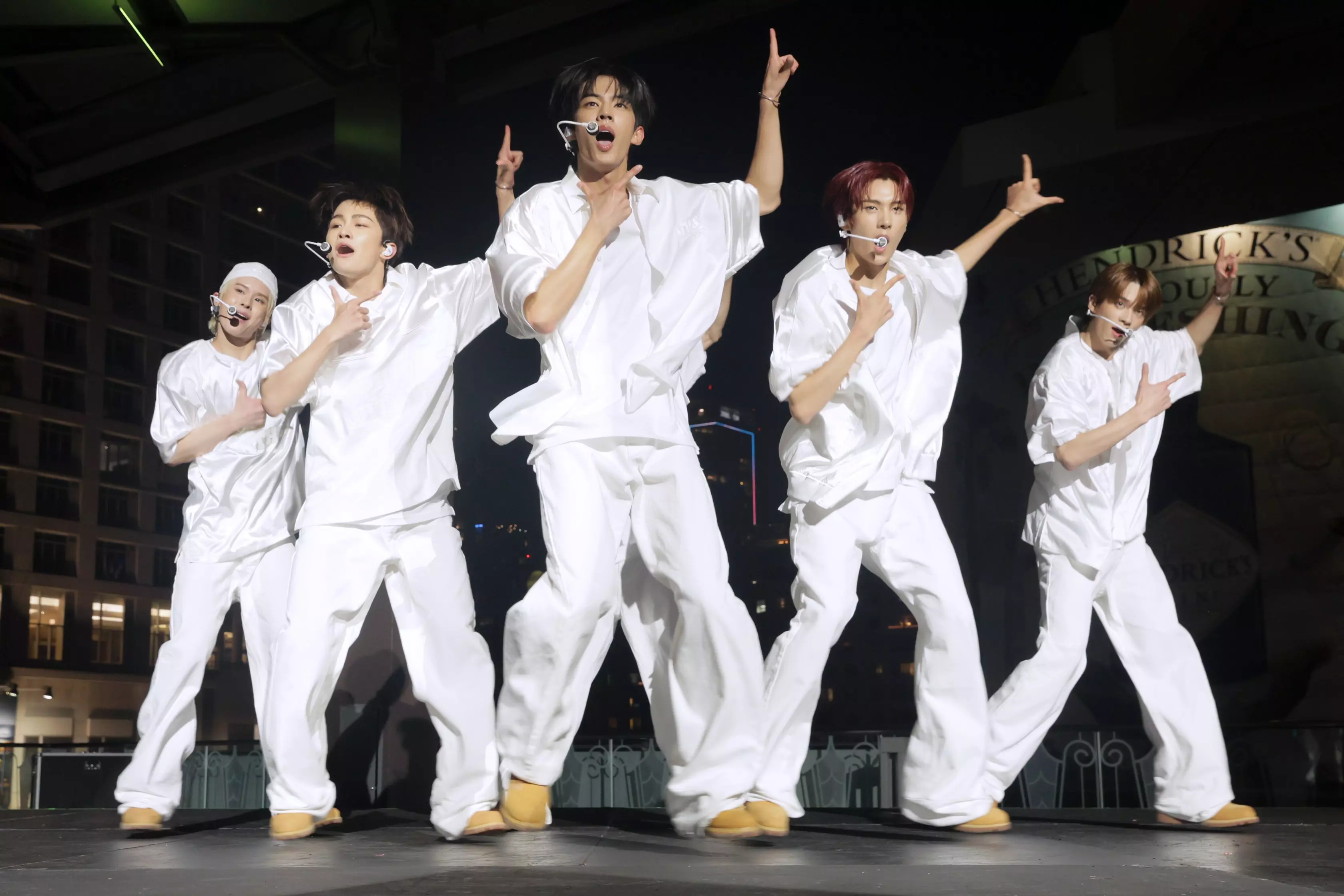
5 Takeaways From The GRAMMY Museum’s "HYBE: We Believe In Music" Exhibit
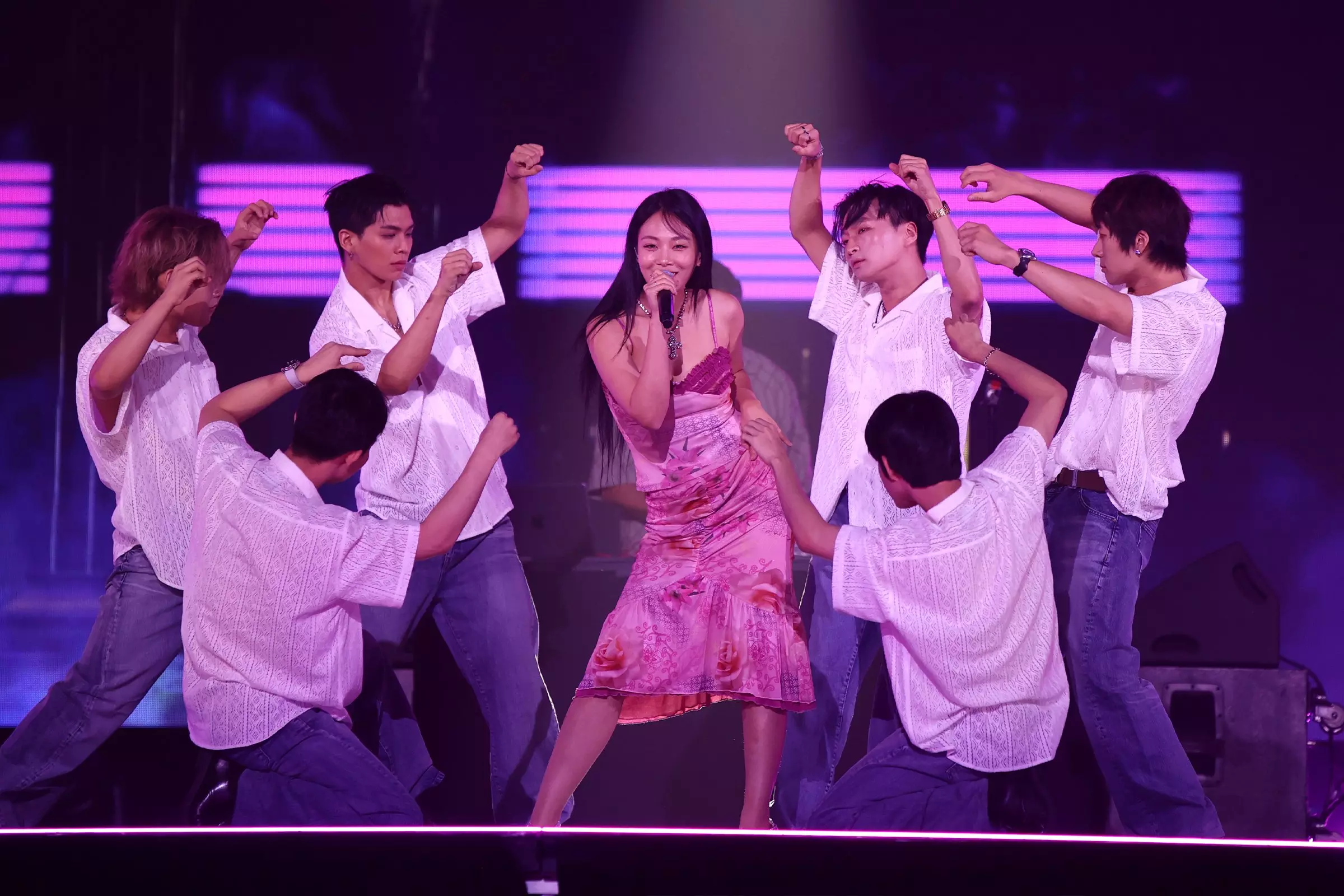
KCON L.A. 2024: 7 Highlights From NCT 127, ZEROBASEONE, NMIXX & More
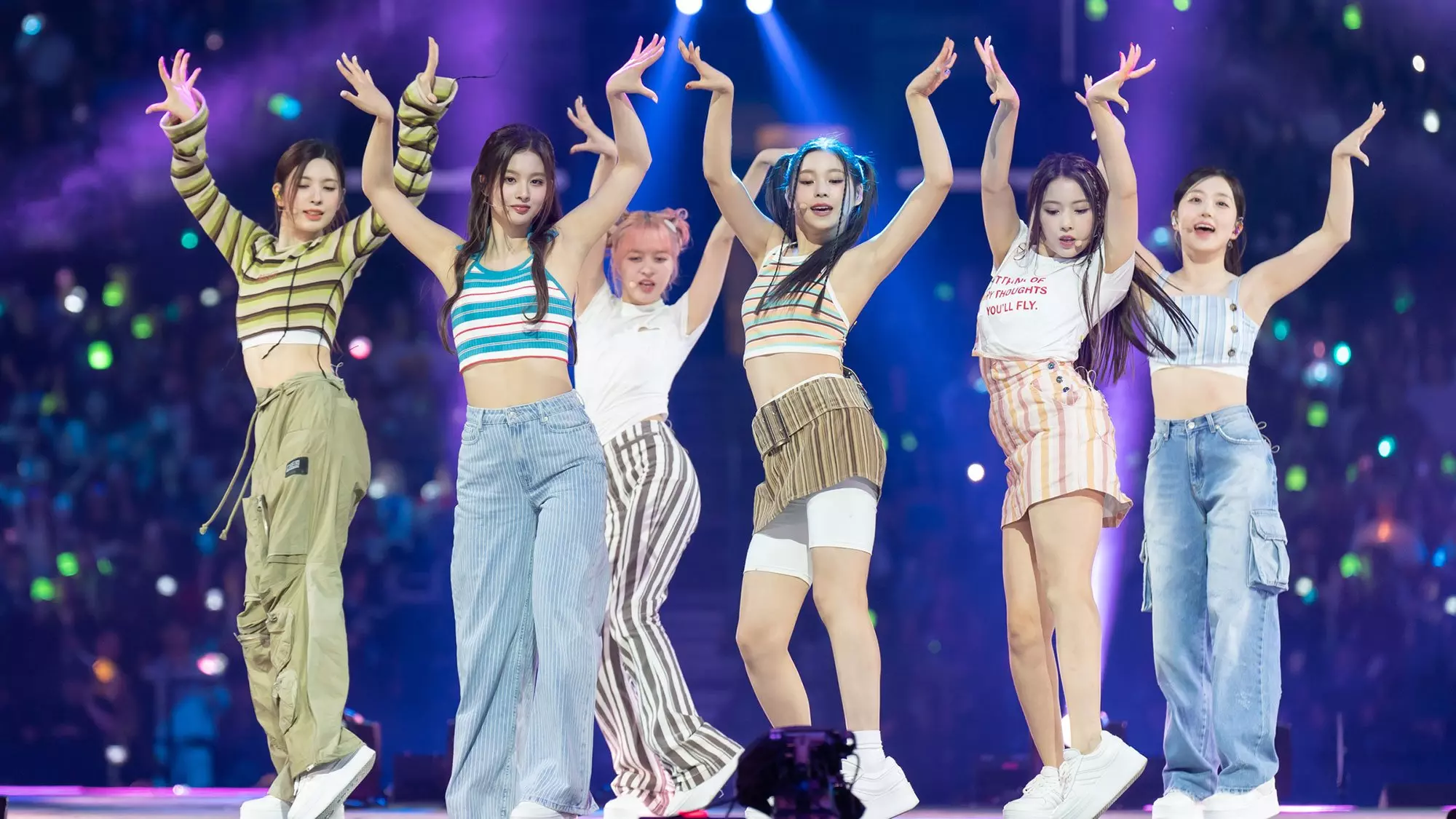
KCON L.A. 2024 Returns: Get Ready With This Playlist Featuring NCT 127, Zerobaseone, ENHYPEN, Zico & More
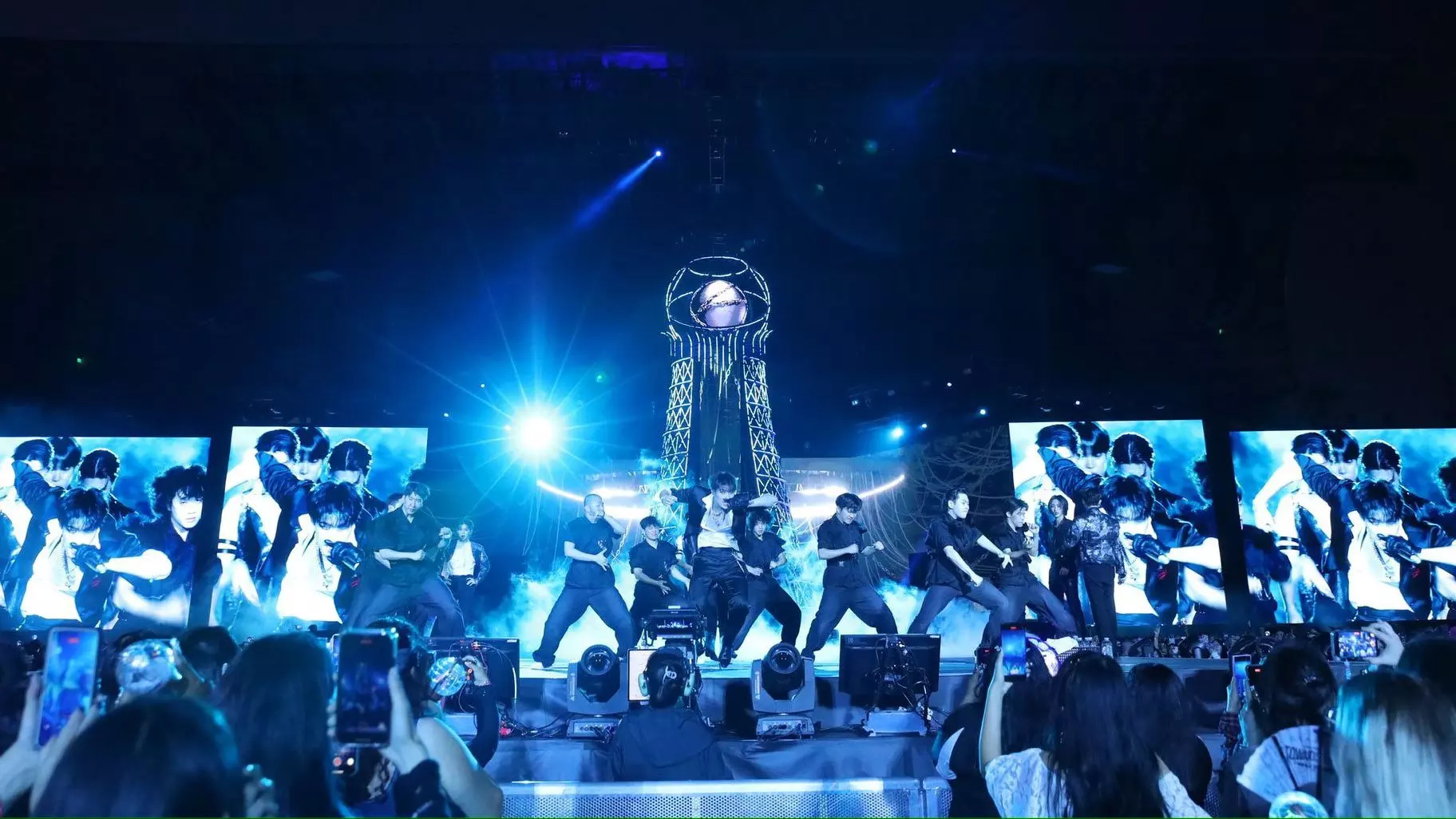
ATEEZ’s First U.S. Stadium Show Was A Triumph & Testament To Their Growth
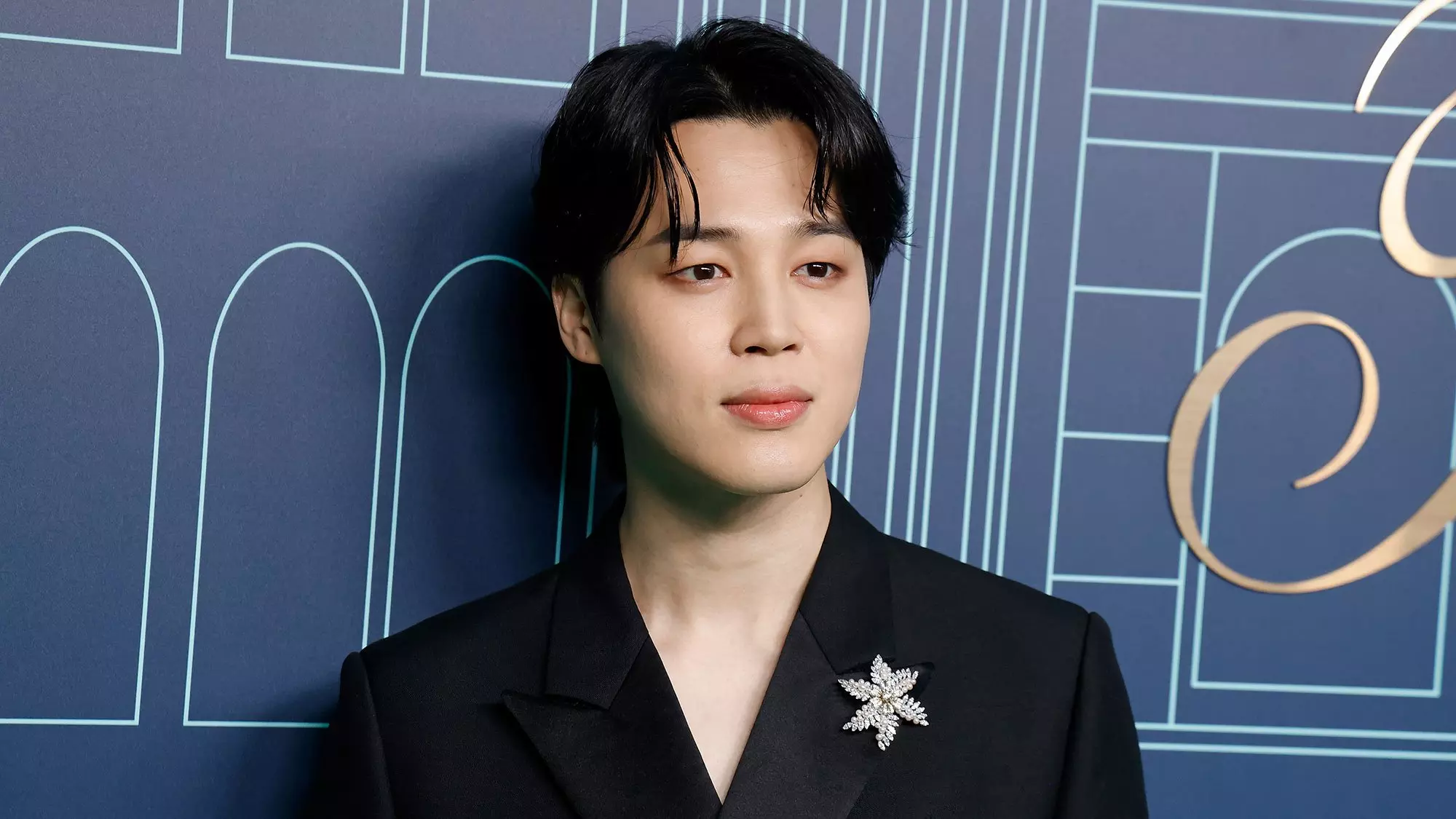
5 Takeaways from BTS Jimin's New Album, 'MUSE': A Bold Exploration Of Love And Inspiration
